#historical theories
Text
Real talk rn.
I learned something recently that made me rethink of Julian Scriabin's death.
A lot of people consider the death of Alexander Scriabin's son Julian mysterious because they find the circumstances, which were his disappearance, then the finding of his corpse later in the Dniepr with the strong evidence that he had drowned, strange.
Because of this this, a lot of people have suspected that it was more than just him "drowning", for example saying that his peers were jealous of his talent which made them put Julian in danger, which would eventually lead to his death, or other theories along this train of thought.
While it's a possibility the jealousy of his classmates could have influenced his death in some ways (perhaps), a lot of people fail to contemplate the entire context of Julian and even his father's life.
It's known that Alexander Scriabin was very eccentric, but unlike what some people could believe, it did not just start when his career kicked off; there had always been a gap between him he his peers. It may have been accentuated by his, possibly, unusual uprbinging, but it was there no matter what nonetheless.
Some of his childhood traits include having a very strong fascination with piano mechanics, enough that he built some himself, being unsociable with kids his age (but appreciative of adult attention), and even when he tried doing activities with his peers, it did not end succesfully. I also recall him telling his mom that his "thoughts wouldn't let" him "sleep".
When he was a teenager, put it the cadets as he was a Russian boy, he was bullied and was given plenty of accomodations to do things he was invested in (piano, music). He was reportedly the only cadet to not have held a firearm once.
In his adulthood, we can note many other unusual reports, like him shaving his head completely because of migraines, being put into a mental asylum (where he said he felt very out of place because he considered the other patients to be actually clinically insane, and that it made his condition, depression, worse), being very nervous, having lots of tics, having severe germaphobia (that translated into OCD-like symptoms if I recall correctly), generally disliked concert halls and preferred playing in salons, and just generally having a completely warped view of the world. I probably missed some.
And this is without mentioning that his whole oeuvre resolves around senses.
But among other mental conditions, it sounds very likely to me that Alexander Scriabin had Autism Spectrum Disorder (and most definitely not a fun one at that). And Julian Scriabin was described as being very similar, in most ways, to his father.
What I learned was that autistic kids are 160 times more likely to experience drowning than their neurotypical peers. If we consider that Julian Scriabin may have had, and likely had, autism, then it would explain how and why he drowned, removing all of the mysticism behind his death.
Note: most information I shared here was written from just my memory, so it might be not totally accurate; don't use this post as a source.
#history#unsolved mysteries#music history#classical music#classical music history#theories#historical theories#history nerd#music nerd#autism#autism spectrum disorder#aspergers#alexander scriabin#julian scriabin
4 notes
·
View notes
Text
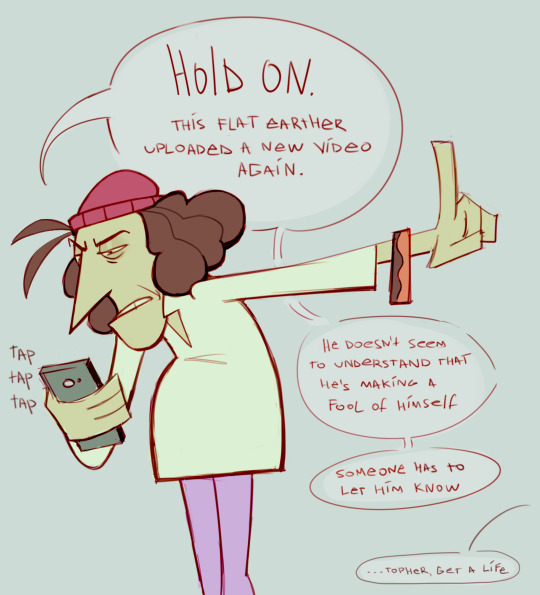
#topher bus#clone high#ch#twas headcanon that he still takes flat earth theory as a personal insult even though he's trying to distance himself from his clone-father#but google said this whole story actually wasn't historically accurate#anyhoo he has a pear shaped globe in his room. so it kinda makes this work on a completely different level
1K notes
·
View notes
Text

Sigh. I’ve had conflict with this person in the past, and I’ve been avoiding talking about them again, but this is especially egregious and I do want to address it.
How do you think the language and religion spread? People didn’t just decide to switch over en masse, they were conquered. It’s ahistorical to deny that.
The idea that Jews are “white” is complicated, but the idea that Jews possess whiteness is a relatively new concept. Conversations about this have been going on inside the Jewish community for a while. The key there is that it’s inside the community. The idea that this individual feels they, as a non-Jew, are the arbiter of Jewish identity is disgusting.
The idea that Jews aren’t the “real Jews” is not only blatantly antisemitic, it plays into conspiracy theories.
The use of Jewish tags (jumblr, am yisrael chai) are yet another instance of this individual trying to make sure Jews see this post, even when those tags are incorrect. This is clearly harassing, and this user does it frequently.
#antisemitism#tumblr#historical revisionism#conspiracy theories#conditional whiteness#whiteness is a legal status afforded to you by cultural perception not an inherent part of your being fuck
358 notes
·
View notes
Note
translated by GT
Today I learned that the Pope has the right to appoint secret cardinals, and even the cardinals themselves may not realize that they now have a new position. Popes have the right to make the name public at any time, but if the Pope dies before the Cardinal's name is made public, the individual ceases to be a Cardinal.
Yes, Catholicism is weird.
But more importantly, there is only one person in the world who can prove that I am not a cardinal.
.
#I've heard of those#stuff is complicated as is and the rules and canon have varied a lot throughout history#don't quote me on this but I believe in order to be eligible to become a cardinal these days you have to be an unmarried catholic man#between the ages of 30 and 75#and an ordained priest at minimum even though in practice all cardinals are bishops or archbishops#but I also think the pope as the sovereign leader has the power to appoint anyone at least in theory#and historically the requirements have been a lot looser popes would create cardinals pretty haphazardly#nepotism was exceedingly common every pope would want to surround himself with relatives friends and allies#at least a few popes allegedly made their lovers into (largely incompetent) cardinals back in the day#answered#anonymous#not that I know anything but everything I've read about the renaissance holy see has immense chaotic energy
215 notes
·
View notes
Text
My thoughts on the volta do mar
In-game, the Volta do Mar method was created to travel through the pale, being first used in the first successful voyage into the pale. Apparently it took years to develop the method, a "strict psychological regimen imitating the creation process of poetry."
In real life, the volta do mar is a Portuguese (volta do mar is Portuguese for 'Return from the Sea') sailing practice of, in simple words, sailing further out into the sea to avoid sailing directly against the wind and then catching winds that then move in the correct direction (useful since portugal is slightly north of the equator, blah blah wind directions)
While watching a playthrough, Joyce's description of Lely's tattoos reminded me of this 'return from the sea' business. Lely's tattoos are a history of his service, but originally the tattoo was a custom of sailors "mark[ing] their bodies to map their travels." "The sailor's soul would use it to fly back home if they should die abroad. This is a sort of… contraption. To be reeled back in by." If a sailor died, their soul would 'return from the sea'(😮).
The pale is likened to the ocean many times in Disco Elysium, so these tattoos and the volta mantras are very similar. They are linked even more when we see that the tattoo custom was begun "right after the discovery of Insulinde," so the creation of voltas and the creation of this tradition kind of bookend the eighth expedition. Likening the irl volta do mar practice and this in game example got me thinking about how exactly in-game voltas are used and created.
(Interesting note, Joyce describes these tattoos as "the silver cord" linking the soul and home, whereas irl, the concept of the silver cord is supposed to link the soul and the body.)
Personally, the concept that is pale was hard enough for me to grasp (even with it being an established fictional concept with, like, words to describe it.) It's "the opposite of reality," it's a property that suspends other properties, and it can damage human minds. According to Joyce, dialectical materialists argue that "pale somehow *consists* of past information, that's degrading. That it's rarefied past, not rarefied matter."
"They call it the *blend-over of the self*. The pale does not only suspend the laws of physics, but also the laws of psychology, maybe History, even… The human mind becomes over-radiated by past."
We can assume that this 'blend-over of the self' is true because of the Paledriver, who is observably pale-radiated and lost in worlds in lives that her body hasn't lived.
Operating on this theory, the pale is made of information, and I would also like to argue that pale is made of not only past information, but also future information, and information about alternate timelines.
In the moralist vision quest, we hear entroponetic crosstalk of Kim from the future *and* arguably an alternate timeline if he ends up in the hospital and doesn't end up at the islet. So pale is basically all information and possibilities.
The only explicit example of a Volta do Mar is from the Insulindian Miracle thought, and it's song lyrics from What If by Teho Teardo & Blixa Bargeld. This thought establishes that voltas are 1) Taught in schools and 2) Repeated like mantras while travelling. The voltas aren't mentioned in Sacred and Terrible Air, by name at least. Zigi does sing Helvetti, by Kauko Röyhkä & Riku Mattila, in pale, but that's explicitly a song and not a poem, and obviously he doesn't need to resist the effects of the pale (and if fact doesn't want to drive away the pale, based on his reaction to Nilsen's 'Communism is white' speech when it started to ward off the surrounding pale.)
When Joyce says that the method is a "strict psychological regimen imitating the creation process of poetry," my thinking was that it can't be as simple as reciting poetry while travelling through the pale. It might be, but wouldn't the process *be* the process of creating poetry and not 'imitating' it? Of course, it could just be referencing the research it took for the explorers to be able to safely traverse the pale, but I wasn't satisfied with that.
(I'll admit, when I first began building this theory, I didn't know that we had an explicit example of a volta, and it stumped me for a bit, but I think it works still.)
I've seen interpretations in which the poetic nonsense of voltas force the person to focus on reality/on their own mind, to focus on the next word in the sequence. But using the real world volta do mar technique as a base, I started building my own theory by considering that the voltas mirror the technique of the irl volta do mar. Voltas would be performed by a person going deeper into the pale (whether mentally or physically) in order to somehow escape the effects more easily.
Having already established that the pale is information, it makes sense that the way to manoeuvre it would be via words and concepts. Prior to remembering The Insulindian Miracle thought, my theory was that, instead of pilots being *taught* previously written mantras, they were taught to create poetry while immersed in the pale. The pilot's mind would then grasp the floating information that is pale to string the words together into a distinct phrase/poem, intentionally going deeper into the pale to get enough material to work with. With the resulting phrase, it would be grounding enough to bring the pilot back to reality.
However, all of that is irrelevant when you consider the volta that Harry was taught.
Or is it?
The Insulindian Miracle solution says that "you were taught it at school. It is one of the Volta do Mar mantras repeated on the voyage that lead to the discovery of the Insulindian isola." I could interpret it as saying that voltas are written in advance, or that *historical* voltas are taught in grade school, just like we're taught historical documents or literature. Maybe children of Revachol are taught about the voltas that the discoverers of their isola used simply for academic knowledge.
And as Joyce says, the Volta do Mar is also used by "other troubled souls even to this day." Ordinary people may not have access to the bank of information that is the pale, but they do have their own troubling thoughts that they can pick words and concepts from to still go through the same process that I've described in order to calm themselves or relieve stress.
I do want to analyse Kim's Volta do Mar skill at a later time using all of this, but right now this is what I have to offer :)
(An excellent post that I was inspired by is about the connection between water and memories by @/57sfinest, which I would like to briefly reference at the end of all this analysis. Imagine it as a triangle, one point is the ocean that the sailor's souls would have to return from (or the irl ocean that the volta do mar was used for, if you like), the second point is the past and memories, and the third point is the pale, the "rarefied past." It's all connected.)
#is this anything maybe#tell me if theres any glaringly incorrect things or anything ive missed here pls#i have gone through so many interpretations of kims skill i have no idea#of course this whole theory only works if you believe that only historical voltas are taught in schools#and not pre written ones for general use#i think the 'troubled souls' could also possibly recite well known voltas for the sake of having a mantra#contains inconsistent capitalization#disco elysium#disco elysium meta#disco elysium spoilers#corvid creates
111 notes
·
View notes
Note
Maybe this is too broad, but wondering if there's a better term than "conspiracy theorist" to describe some large figures in the ongoing national discourse? Not that "fluoride in the drinking crowd" were serious thinkers or total harmless, but am I alone is finding "conspiracy theory" too quaint and mild to describe how mainstream rather fringe these things are and also how totally evidence-free and something just plain dumb they can also be?
I don’t think conspiracy theories have ever been quaint and mild.

Think about the history of antisemitism from medieval blood libels to 19th century theories of Jewish financial cabals to the “Protocols of the Elders of Zion” dreamed up by Tsarist agents-provocateur that took the theory global and spawned untold numbers of imitators, to Hitler’s invention of “Judeo-Bolshevism” that married traditional antisemitism to anti-Communism and nationalist populism. Conspiracy theories one and all, but fully capable of spawning pogroms and fascist dictatorships.
Likewise, we think of Anti-Masonic or Illuminati conspiracy theories as self-evidently ridiculous and harmless, but we forget that they were used by cultural conservatives in church and state to wage culture wars on the Enlightenment, liberalism, secularism, democracy, every revolution from America to France to 1848 and beyond, feminism and almost every social movement of the 18th and 19th century. People died or were surveilled or were sent to prison, political parties were formed or banned, and conservatism itself was founded in the name of “poisoning the minds of the lower orders” to inoculate them from the influence of secret societies.
As Dan Olsen has shown, even seemingly benign conspiracy theories like the JFK assassination cover-up or the Moon landing was faked or the earth is flat can hide much more malign motivations, just waiting for the opportunity to radicalize and proselytize:
youtube
#history#historical analysis#cultural history#conspiracy theories#conspiracies#anti semitism#illuminati#freemasons#flat earthers
140 notes
·
View notes
Text
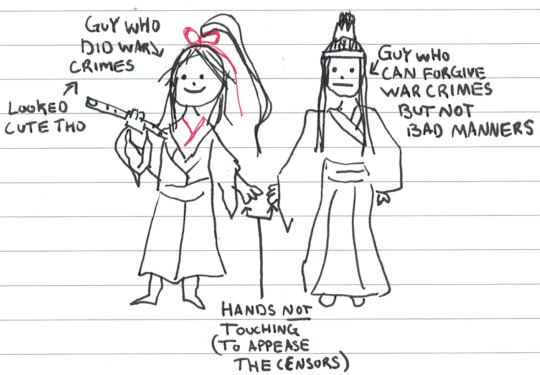
Drew WWX and LWJ after I finished my rewatch of The Untamed a few months ago. I have gotten marginally better. May this set a benchmark for what to expect from this blog.
Edit: June 2023 redraw
#Poorly Drawn MDZS#MDZS#wei wuxian#Lan Wanji#there are a lot of great artists in this fandom. I am not one of them#I've always admired artists a lot so I wanted to try learning how to draw#And the only way to start is to draw a lot. Enter the audio drama (and my desire to listen to it guilt free)#doing both at once was my way of participating in my own fandom#as much as I wanted to be super social on the MDZS forums...I honestly got really nervous#I have nothing to contribute besides going 'cool!' to other people's art#Writing and historical/theory posts. It kinda felt worse than isolation...#That aside...I am just here to dump my silly comics and I expect absolutely nothing to come of it#I'm blogging like that lady from that julia child movie. about the cookbook. I forgot what its called. this is just a journal to me
432 notes
·
View notes
Text
I just had the biggest revelation
I think Ephemera is based on Aeneas, the founder of Rome. Specifically the version of him that’s expanded upon in Vergil’s Aeneid. I know we joked about him being the founder of Italy and all but deadass. yeah. With lots of kh characters nowadays having ties to various mythologies, or at the very least, being named after certain figures, this makes so much sense


just….god. It’s all there isn’t it

#khux#khml#not my english major ass being tempted to read Aeneid now to get more info#surprised I never read it in school actually considering how much other historical literature I had to read#wait is this where the eph founded italy joke came from in the first place? did someone else already have this revelation?#my brainworms are going nuts y’all…..#my posts#timeless child#my theories
117 notes
·
View notes
Text
Most of the characters in hogwarts legacy would have been alive during the sinking of the Titanic. Thats it that’s the post.
#hogwarts legacy#Hogwarts legacy shitpost#hogwarts legacy game#Hogwarts legacy theory#hogwarts legacy headcanons#Sebastian sallow#Ominis gaunt#leander prewett#garreth weasley#poppy sweeting#natty onai#hogwarts legacy history#hogwarts#hogwarts legacy sebastian sallow#hogwarts legacy ominis#hogwarts legacy boys#hogwarts legacy slytherin boys#hogwarts legacy ravenclaw#hogwarts legacy gryffindor#Hogwarts legacy Hufflepuff#hogwarts legacy hc#hogwarts legacy mc#hogwarts legacy setting#hogwarts legacy historically accurate
42 notes
·
View notes
Text
She was the night wolf. But only when she dreamed. (The Blind Girl, ADWD)
"The hour of the wolf. The blackest part of night, when all the world's asleep." (The Kingbreaker, ADWD)
Thinking thoughts...It's the longest, darkest hour of the night, Arya is the Night Wolf + Dark Heart, it's the time when "the world's asleep" and Arya wargs into Nymeria and the leader of a giant pack of wolves while sleeping, and it's likely she'll reunite with Nymeria right before the long night...
#arya stark#and it being the the hour before dawn...#corn plate moment or no y'all? cause I see the vision 🤭#It just fits so well? like Arya being the Night Wolf alone is enough for me to make the connection and run with it#also the hour of the wolf being an actual historical event denoting Cregan Stark's time in King's Landing?#reminds me of Harwin kneeling to Arya at the Inn of the Kneeling Man...Arya really stacking up historical references#The Lady of Winterfell-ism is just so strong in her chapters and connections how can I not say Queen#/a time for wolves/ was actually about Arya Nymeria their pack and her becoming a leader in the North (and I'm only half joking)#also feel like this could be tangentially related to Jon via the /Black Bastard's heart/ reference + him waking at the hour of the wolf +#his connection to the Others and the North + foreshadowing for KITN...could be a hint of his resurrection#or it could be nothing and I'm just overthinking things but I've seen a lot flimsier theories so 🤷🏾♀️#twow speculation#?? I guess
92 notes
·
View notes
Text
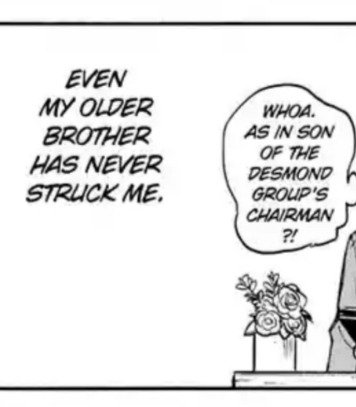
This screenshot from ch 9. maybe it's just me and my overthinking, but what the hell. Is it just a random sentence for an epithet? Before ch 93 it may be a bit reasonable, but now it doesn't fit Demetrius' character in any sense. It's more weird if you remember that Endo usually doesn't leave details without thought.
#spy x family#sxf#sxf manga#spy x family manga#spy x family manga spoilers#sxf spoilers#spy x family theory#sxf theory#damian desmond#demetrius desmond#is there any historical context?? cuz i really don't understand
32 notes
·
View notes
Text
Ch210, Where is F. O. L. Orphanage?
⚠️ long post ⚠️
I was discussing that question with @juxl25, and I think we came up with a good choice for its location.
The only information we know for sure is that it's in Norfolk, and that it's near a river. We also know Finny and Snake took a train to a nearby town and walked to the orphanage.
We also know there's a wind pump that drains water from the surrounding marshland. There are at least four major rivers in the area used for draining the marshes: Yare, Bure, Wensum, and Ouse.
Juxl25 suggested River Yare and the historic Red Mill (the wind pump) as the area but was looking at Manor House, which is farther away, in the village (proper) of Haddiscoe, Norfolk. After some digging around, I agree with River Yare and Red Mill/Langley Detached mill (originally called Langley detached windpump...
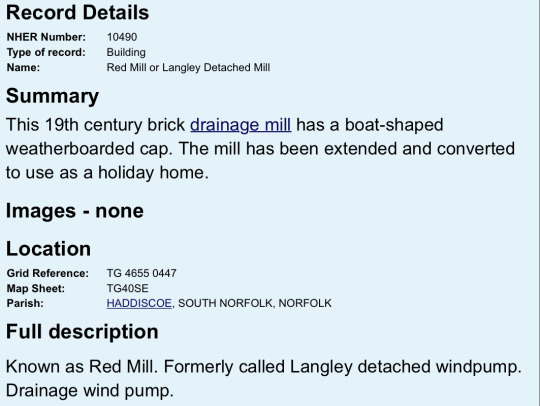
...or Langley Detached drainage pump).
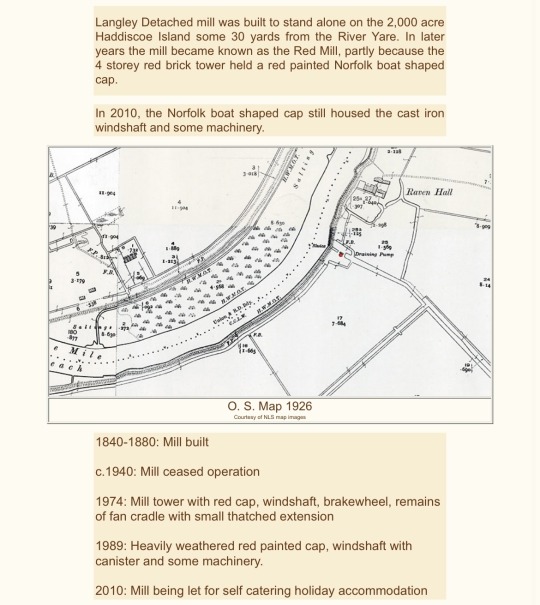
They are in an area northeast of Haddiscoe village, called Haddiscoe Island (these days), thanks to a canal added to connect River Yare and River Waveney farther inland, creating an island of the area and making the marshland there more remote/less accessible.

There's a historic farmhouse just east of River Yare, not far from Red Mill, called Raven Hall. And Raven Hall would be a premium location to have a secluded facility like F. O. L. Orphanage.
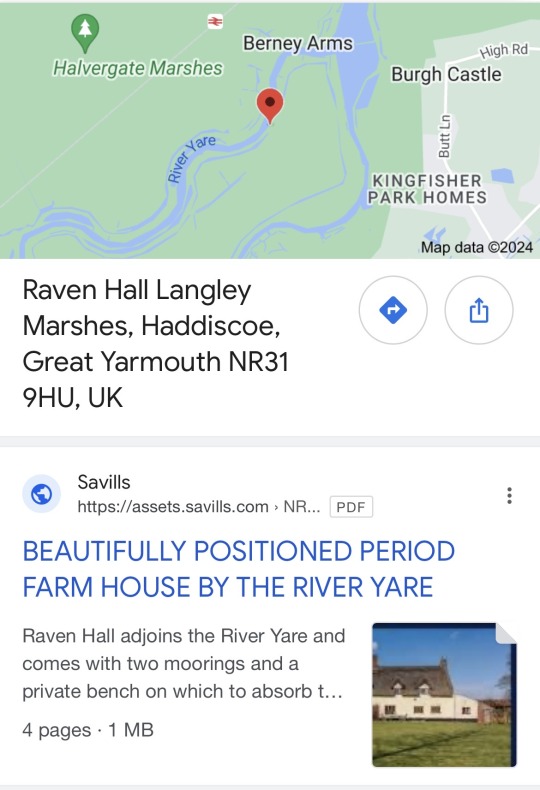

There's only one thing I don't like about the buildings shown for Raven Hall -- it's a bit farther from the drainage pump than I want it to be, and it's just a large farmhouse (almost 3000 sqft) and a long barn (almost 900 sqft). But there's a cool space just south of those buildings, which would be ideal for the main orphanage, as well as a spot for the stables/barn leading closer to the drainage pump, farther south. Here are two options for the placement of F. O. L.:
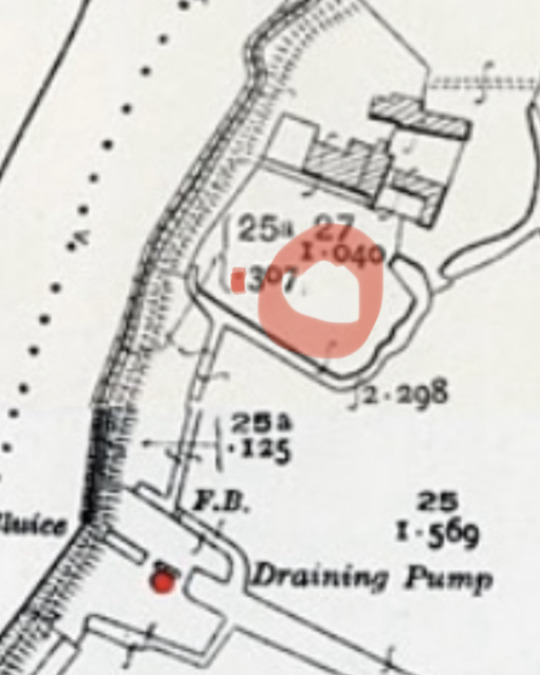
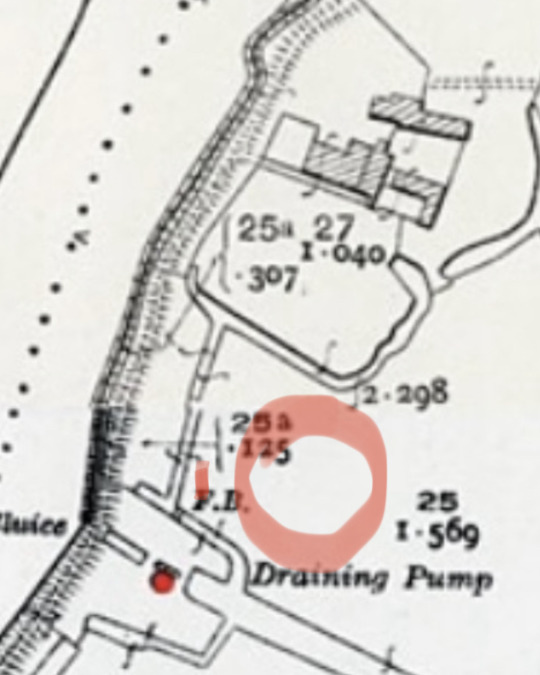
In each case, I've placed the stables to the west of the main house, as a small red rectangle (more or less), while the windpump was already marked by a red dot farther southwest. Looking at the bend of the river on Theo's image of a map of the place, the placement on the right (above) might be the better match. Then again, it could be exactly where Raven Hall is located. And Raven Hall, having been built in the 17th century (or at least 1700), is older than Red Mill (built in 1840).
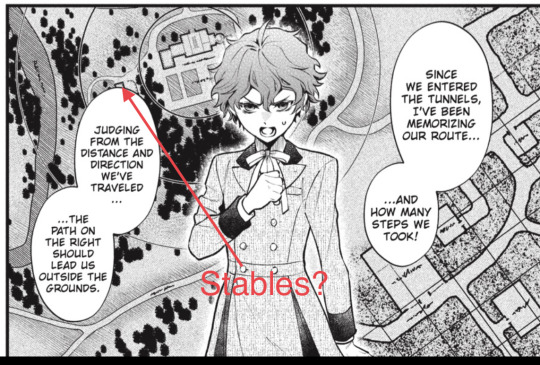
Too bad I can't see the placement of the windpump on his map, but I think it's somewhere behind the speech bubbles on the left side of the panel.
We see that the windpump at the orphanage has a low roof of some kind, and juxl25 explains that someone was probably living onsite just to maintain it full time. I did find at least one pic showing Red Mill with what could be the old maintenance shed/shelter, but it seemed to be on the wrong side. Who knows? I guess it depends on which way the sails are facing to catch the wind? But the low roof in the panel is probably just the top of some shed.
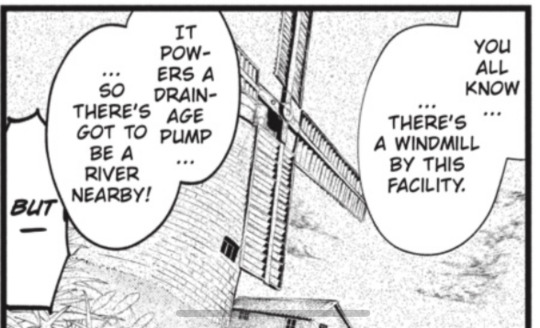
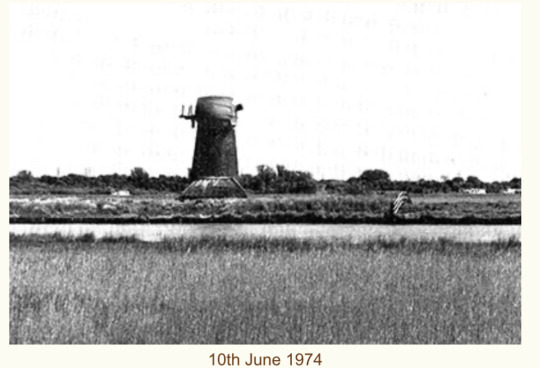
Oh, and near St Olaves, there's a train station called Haddiscoe Station. They could have got off the train there and made their way north to the orphanage by foot. Or did they hitch a ride part of the way? I'll have to go back and check.
I'm still considering one other location, not far from there, but I won't post it unless further research looks more promising.
Hey... can you imagine if all this time... F. O. L. was just some place name reference... like "Farmhouse on Langley" (Marshes)?!?
Please let these kids break the windpump and flood the tunnels.... 🙏
#black butler#kuroshitsuji#ch210#real places#historical references#norfolk#haddiscoe island#langley marshes#red mill#langley detached drainage pump#langley detached mill#langley detached windpump#theo#theodore#raven hall#theories#ideas#discussion#observation#long post#long reads#mar 19 2024#haddiscoe station
31 notes
·
View notes
Text
A hypothetical look at the childhoods of Carlo and Romeo
Despite Carlo and Romeo being two of the most central characters of Lies of P, what we know about their backstory is next to marginal. We know that the two of them went to school together and were best friends (perhaps even more than that), but their time in Monad Charity House is only presented in snippets and fragmented memories, and despite being highly significant, their characters remain elusive - like shadows cast over the entirety of the story, always present, never tangible.
Thus, many have filled the gaps left in their characterization with their own imagination. As for myself, I was curious what their early lives might have been like, before they met at Monad Charity House - and since it was the closest thing to the game's setting I could find, I did some research on Victorian children and their upbringing.
What I found out, however, left me absolutely shocked and made me keenly aware of just how awful Carlo and Romeo's childhood must have been, going by historic standards. As pretty much everything during the Victorian Era, a child's upbringing was very dependent on social class - however, no matter if you grew up in a rich or poor family, each came with its own kind of suffering, and regarding the question of "What were Carlo and Romeo's lives like before Monad Charity House?", the brief answer would be: "Probably not great."
As for the long answer... I should mention this is my own interpretation of Carlo and Romeo's backgrounds, and none of this is officially confirmed. However, given what we know about the two's origins, I consider it quite plausible, and what we can conclude from it might not only give us better insight into their personalities, but also some of the real-life background behind the original fairy tale of Pinocchio.
Just as a fair warning, though: This is about to get a little depressing.
[Spoilers for Lies of P!]
[CW: mentions of very questionable parenting methods, depression, suicidal ideation, poverty, parent death, child labor, abuse and exploitation of children]
Carlo
For this analysis, I'm going to assume that Carlo was born into a fairly well-off household. (The description of Carlo's portrait calls him "an aristocratic boy", and since Geppetto is the mastermind behind Krat's puppet technology, I assume he'd have his fair share of the profits.)
By the standard of their time, upper-class children were quite spoiled: Unlike their working-class peers, they never had to worry about who was going to provide food for them, and the horrors of child labor were never of any concern to them. You would think that being born into a rich family doesn't leave you a single thing to wish for - you'd have nice toys, fine clothes... and well, everything, except for parental affection.
For the most part of the day, upper-class children wouldn't even see their parents - they were only summoned to appear before them at a set hour of the day, and during these occasions, they had to address their fathers as "sir". Essentially, meeting your parents was more like an audience with a stranger, a rare privilege strictly regulated by formality. Children were expected to act prim and proper, only allowed to speak when spoken to, and thus unable to express their true feelings, thoughts, or opinions. Any show of affection was extremely rare - Winston Churchill (1874 - 1945) once remarked that he could "count the times he had been hugged by his mother" as a child.
The parents were more or less completely absent from their children's lives, and when there actually was interaction between them, the children were expected to unconditionally obey their parents. Osbert Sitwell (1892 - 1969) once commented: "Parents were aware that the child would be a nuisance and a whole bevy of servants, in addition to the complex guardianship of nursery and school rooms was necessary not so much to aid the infant as to screen him from his father or mother, except on some occasions as he could be used by them as adjuncts, toys or decorations." (Can you imagine? Geppetto taking Carlo to some big social event to show off his "perfect little son", and Carlo just standing there and silently enduring the ordeal, looking at his father all the while and wondering "Did he ever realize I'm not one of his puppets?")
So, by the standard of the time period Lies of P is set in, Geppetto neglecting his son isn't even anything terribly unusual - in fact, that's perfectly normal Victorian upper-class parent behavior.
Since they didn't take care of their children themselves, upper-class parents would hire a nanny to raise them. Nannies would be instructed what kind of behavior and morals the parents wanted instilled into their child, and they would be responsible for their education as well as teaching them manners, propriety, how to dress and so on. As such, the nanny effectively acted as a substitute for the parents - and given that maid puppets exist and Geppetto probably wouldn't let any strangers near Carlo, Carlo's nanny was most likely a puppet as well.
The daily life of upper-class children was based on strict routine - some like to say it operated with "clockwork regularity". Breakfast would be served at 8 o'clock in the morning, dinner at 12 o'clock, and tea at 6 o'clock.* Children would very seldom leave their room, except to take short walks in the park with their nanny. Education would mostly be given at home by a tutor, which included basic lessons like reading, writing, and arithmetic, but also "socially appropriate skills" like dancing and playing the piano. (Since we see a puppet giving piano lessons to a child in the intro, chances are Carlo's tutors were also puppets.)
*Eating times varied throughout the Victorian Era; a "dinner" might also be a meal eaten during midday.
The rest of the time, children would have nothing to do but to play with their toys (except on Sundays, which was forbidden). Rich families had the luxury of being able to afford the most elaborate of toys, such as automated dolls, clockwork trains, and jack-in-the-boxes, which were extremely popular among children. In fact, since clockmakers were also the ones to build toys, I could imagine Geppetto actually made the toys for Carlo himself. (However, I feel like this only would have made Carlo loathe them; in his eyes, it would've been proof that "father pays more attention to the toys he makes for me than actually looking at me".)
In short, the life of Victorian upper-class children was lonely, depressing, and stuffy to the point of suffocating. Given these circumstances, I would actually be surprised if this didn't leave mental scars on Carlo. It has been documented that a lack of parental affection causes psychological issues lasting all the way into adulthood, such as low self-esteem, trust issues, anxiety, difficulty with social relationships, and lack of emotional control. Also, considering Carlo was probably surrounded by puppet servants all day, he wouldn't even have had a single human being to interact with most of the time - something which most likely had a detrimental effect on his psyche.
Given this dreary existence, it would make absolute sense for Carlo to look nothing short of depressed in every depiction we see of him. The feeling of emptiness when being pressed into the corset of others' expectations is actually something I'm well acquainted with - it feels like walking beside yourself, like your body moving while actually feeling dead inside. A bit like a puppet on strings, if you will. With his life being a monotonous routine controlled by someone else, it wouldn't be surprising if Carlo had difficulty still seeing a purpose in it. (There have been some theories going around that Carlo committed suicide; at the very least, I think it's highly likely he had suicidal ideations during his youth.)
Perhaps this is where Pinocchio - the character from the fairy tale - might have become something like an identification figure for Carlo. Pinocchio was a puppet, but instead of doing what his creator intended - what his father expected - he did whatever he wanted. I'm sure Geppetto gave him the book as a measure to educate him, but it ended up having the opposite effect. In fact, it might have been what first taught him the concept of freedom: Geppetto's puppets only ever did what he told them to, executing the exact actions he had programmed them with, over and over again - but Pinocchio showed Carlo that it didn't have to be this way. (I've seen a lot of interpretations of Carlo disliking puppets, and while I can see where this is coming from, I don't think this is because Carlo disliked puppets in general. Rather, I think he saw them as "extended arms" of his father and a symbol of his need to control everything around him; otherwise, it would be a little strange for Carlo to be attached to the story of Pinocchio so much.)
However, I think beneath all the pent-up frustration and hatred, there was also the wish for his father to love and appreciate him. At the end of the book, Pinocchio returns to his father after all the hardships he had to go through, and the two reconcile and live happily ever after. Since Pinocchio's father goes looking for him when he disappears, perhaps Carlo believed that if he rebelled against him and put himself in danger, Geppetto would realize that he actually cared for him.
So, if Carlo was very prone to temper tantrums and acting defiantly towards his father, it might have been on one hand to show that he didn't want to be part of Geppetto's perfect stage play anymore, and on the other because he was vying for his attention. Due to his upbringing, however, Carlo wasn't really able to communicate his feelings in a proper way. (I like to imagine Carlo as a very emotional person, but having difficulty to actually express his feelings.)
Geppetto, however, wouldn't have the sensitivity to understand this - he most likely would've tried to rectify his son's "mischievous behavior" by disciplining, as was typical for the time period (in general, it was believed that you had to "beat the evil out of children" for them to become a good person). Of course, that wouldn't have made things better - in fact, I wonder if part of the reason Geppetto sent Carlo to Monad Charity House was that he was just at a loss what to do with the boy. Since all of his educational measures were fruitless, perhaps he thought that sending him to the boarding school would finally put Carlo on the right track - although the result of that probably was also quite different from what Geppetto expected.
Romeo
Meanwhile, poor Victorian children had to live in a completely different, brutal reality - for them, day-to-day life was a literal struggle to stay alive.
We know that Romeo was an orphan, and according to Eugénie, that's not much of a rarity in Krat. Indeed, street children existed in abundance during Victorian times: It wasn't uncommon for working-class children to lose one or both parents - due to unsanitary conditions in Victorian slums, many people died of disease, and given the hazardous working conditions in factories and coal mines, accidents were commonplace. However, the term of a Victorian orphan was actually a little broader than that, also extending to children who ran away from home due to hailing from alcoholic and neglectful families. Often, mothers who were single or had a child out of wedlock would also simply abandon their children. Whatever the reason for their situation, these children were forced to fend for themselves at a very young age.
In the Trinity Sanctum in Krat Central Station, there's a note mentioning a "pickpocket who was overconfident in a gamble" and "had his heart stolen and died". Since Romeo made "a deal with the devil" (the "devil" presumably being Geppetto who turned him into a puppet), people have interpreted this as referring to Romeo. Turing to crime to support themselves was not a rarity among poor Victorian children - in fact, half of the defendants tried at the Central Criminal Court of England and Wales between 1830 and 1860 were aged 20 or younger. There were even organized gangs of child thieves who were trained in pickpocketing by a "captain", similar to those from Charles Dickens' novel Oliver Twist. (However, the items that were stolen most often were actually not purses or pocket watches, but handkerchiefs; silk handkerchiefs had a pretty high resale value, and the thieves would take them from pockets, rip out the initials, and resell them for a good price.)
We can't be sure whether Romeo teamed up with a few other kids or not, but personally, I'd wager he did - it would be much safer to operate in a group in case one of them gets in trouble, and overall, Romeo's personality seems a bit too caring for a lone wolf. (As the King of Puppets, he was not only determined to save as many humans as possible, but also possessed the unconditional trust and loyalty of the other puppets. To me, this means he most likely cared about them, and they cared about him in return - if it was just programming, the puppets probably wouldn't be lamenting his loss after he dies. Compare this to Geppetto, who has to use force and coercion for others to obey him.)
Also, since the notes in the Trinity Sanctums always seem to have a connection to the place where they're located (factory worker -> factory; cleric -> cathedral; "greatest singer"/Adelina -> opera house), that would mean the train station was most likely Romeo's base of operations.* (Train stations tend to be very popular among thieves, since it's easier to pick pockets in the confusion of people boarding or getting off trains.) This would imply that Romeo didn't grow up in Monad Charity House since he was an infant, but arrived there at a later point during his childhood.
*EDIT: I just had a thought that the note in the Trinity Sanctum could also mean the train station is the place where Romeo died. (All the other notes are connected to murder or some other violent action, and since we can assume they were written by Arlecchino, he was probably more interested in that.) Since Geppetto has his secret workshop wagon in Krat Central Station, maybe the place where he built P is the same where he built Romeo.
Since there were so many orphaned children, the few orphanages that existed couldn't receive all of them. Instead, workhouses were established as institutions for all kinds of destitute people - including orphans - who were unable to support themselves and were given lodging and food in exchange for labor. However, many children actually preferred living on the streets, rather turning to crime than going to the workhouse. At a first glance, this may seem a bit unreasonable - surely, not having to run around in worn-down rags and steal your food just to survive would at least be an improvement?
Well... Turns out, not really. The conditions in Victorian workhouses were notoriously awful - they were overcrowded, unsanitary, and cruel places to live. Daily routine was strictly regimented, consisting of 9–10 hours of repetitive and physically demanding labor and very little free time. What little food there was was of poor quality, privacy was basically nonexistent, and the dozens of inmates sleeping together in dormitories often had to share their beds - children usually had to sleep up to four in a bed. The consequences for refusal of work or any kind of rule violation were beatings, deprivation of food, being locked up in solitary confinement in a dark cell, and other draconian punishments.
If this doesn't sound like a very hospitable atmosphere, that's because that was the exact intention behind it. Workhouses weren't meant to support poor people - they were supposed to scare them into finding work and make a living for themselves. Victorians viewed poverty as a self-imposed misery, and if you were a pauper, that was because you were lazy, retarded, or made bad choices in life. That's why beggars, vagrants, orphans, criminals, and mentally ill people were all indiscriminately housed in workhouses, because from the Victorian point of view, they all belonged to the same category of people: A stain that had to be removed from the public eye, either by forcing them to support themselves or by making use of their work force once they had donned the workhouse uniform. They were a nuisance to society, and their treatment in the workhouse was sure to make them feel that.
One of the worst fates for workhouse children, however, was to be hired out as pauper apprentices: Usually from 10-13 years of age, but sometimes as young as eight or seven, workhouses would send pauper children to factories in the countryside for an "apprenticeship". This "apprenticeship" involved factory owners buying children from orphanages and workhouses and making them sign a contract that lasted until they were 21 years of age, dictating that the apprentices had to be provided with food and accommodation, and in exchange, the factory owner was free to make use of their working power.
So in summary, workhouse orphans were essentially sold into slavery. This was all that much easier to do with children who had no parents and no other means to support themselves, and thus were free to be exploited by their employers. Some of the recollections from these former pauper apprentices are just utterly horrific - and in this case, I think it's appropriate to let the victims speak for themselves.
John Birley, who lost his father when he was two, lived in the Bethnal Green Workhouse for a time after his mother died of illness when he was around six. He was sent to Litton Mill as a pauper apprentice, and he had this to say about his experiences in an interview with The Ashton Chronicle in 1849 (source):
The same year my mother died, I being between six and seven years of age, there came a man looking for a number of parish apprentices. We were all ordered to come into the board room, about forty of us. There were, I dare say, about twenty gentlemen seated at a table, with pens and paper before them. Our names were called out one by one. We were all standing before them in a row. My name was called and I stepped out in the middle of the room. They said, "Well John, you are a fine lad, would you like to go into the country?" I said "Yes sir".
We had often talked over amongst ourselves how we should like to be taken into the country, Mr. Nicholls the old master, used to tell us what fine sport we should have amongst the hills, what time we should have for play and pleasure. He said we should have plenty of roast beef and get plenty of money, and come back gentlemen to see our friends.
The committee picked out about twenty of us, all boys. In a day or two after this, two coaches came up to the workhouse door. We were got ready. They gave us a shilling piece to take our attention, and we set off. I can remember a crowd of women standing by the coaches, at the workhouse door, crying "shame on them, to send poor little children away from home in that fashion." Some of them were weeping. I heard one say, "I would run away if I was them." They drove us to the Paddington Canal, where there was a boat provided to take us.
We got to Buxton at four o'clock on Saturday afternoon. A covered cart was waiting for us there. We all got in, and drove off to the apprentice house at Litton Mill, about six miles from Buxton. The cart stopped, and we marched up to the house, where we saw the master, who came to examine us and gave orders where we were put. [...]
Our regular time was from five in the morning till nine or ten at night; and on Saturday, till eleven, and often twelve o'clock at night, and then we were sent to clean the machinery on the Sunday. No time was allowed for breakfast and no sitting for dinner and no time for tea. We went to the mill at five o'clock and worked till about eight or nine when they brought us our breakfast, [...]
We then worked till nine or ten at night when the water-wheel stopped. We stopped working, and went to the apprentice house, about three hundred yards from the mill. It was a large stone house, surrounded by a wall, two to three yards high, with one door, which was kept locked. It was capable of lodging about one hundred and fifty apprentices. Supper was the same as breakfast - onion porridge and dry oatcake. We all ate in the same room and all went up a common staircase to our bed-chamber; all the boys slept in one chamber, all the girls in another. We slept three in one bed. [...]
Mr. Needham, the master, had five sons: Frank, Charles, Samuel, Robert and John. The sons and a man named Swann, the overlooker, used to go up and down the mill with hazzle sticks. Frank once beat me till he frightened himself. He thought he had killed me. He had struck me on the temples and knocked me dateless. He once knocked me down and threatened me with a stick. To save my head I raised my arm, which he then hit with all his might. My elbow was broken. I bear the marks, and suffer pain from it to this day, and always shall as long as I live.
I was determined to let the gentleman of the Bethnal Green parish know the treatment we had, and I wrote a letter with John Oats and put it into the Tydeswell Post Office. It was broken open and given to old Needham. He beat us with a knob-stick till we could scarcely crawl. Sometime after this three gentlemen came down from London. But before we were examined we were washed and cleaned up and ordered to tell them we liked working at the mill and were well treated. Needham and his sons were in the room at the time. They asked us questions about our treatment, which we answered as we had been told, not daring to do any other, knowing what would happen if we told them the truth."
In case there were any surviving family members, the children were sometimes deported without their knowledge. In 1849, Sarah Carpenter related the story of her lost brother who was taken away from Bristol Workhouse to The Ashton Chronicle (source):
When I was eight years old my father died and our family had to go to the Bristol Workhouse. My brother was sent from Bristol workhouse in the same way as many other children were - cart-loads at a time. My mother did not know where he was for two years. He was taken off in the dead of night without her knowledge, and the parish officers would never tell her where he was.
It was the mother of Joseph Russell who first found out where the children were, and told my mother. We set off together, my mother and I, we walked the whole way from Bristol to Cressbrook Mill in Derbyshire. We were many days on the road.
Mrs. Newton fondled over my mother when we arrived. [...] My brother told me that Mrs. Newton's fondling was all a blind; but I was so young and foolish, and so glad to see him again; that I did not heed what he said, and could not be persuaded to leave him. They would not let me stay unless I would take the shilling binding money. I took the shilling and I was very proud of it.
They took me into the counting house and showed me a piece of paper with a red sealed horse on which they told me to touch, and then to make a cross, which I did. This meant I had to stay at Cressbrook Mill till I was twenty one.
So, if the situation in the Lies of P universe in any way resembles that during the real-life 19th century, and if these street children are in any way smart, I think it's very understandable they'd want to stay the hell away from the workhouse or any similar institution. Of course, it would be easy to attribute this to laziness, but honestly, I'd say they just wanted to avoid the abuse. (You could pose the question whether there are even any lowly paid jobs for children to do in the LoP universe, since a lot of those were probably taken over by puppets. However, if you ask me, that might only lead to employers trying to underbid the price that puppet laborers would cost, which would lead to serious wage cuts for any human workers - we know there was a violent protest of the factory labor union, which might have happened for a reason like this. Also, I reckon the puppet industry itself would create new branches of "dirty work", like recycling parts from scrapped puppets, disposing of puppet junk, etc.)
In fact, these harrowing stories happen to have quite a few parallels to the original fairy tale of Pinocchio. Did you notice? The children are taken away in coaches and carts, in a way that conceals their presence (e.g. in a covered cart or in the dead of the night), which is very reminiscent of the Coachman picking up boys at night (in the book, the coach is described as having wrapped wheels, so it doesn't make noise and can't be discovered). At first, the children are told they can make a fortune by working in the textile mills and will have plenty of time for leisure - in A memoir of Robert Blincoe from 1828, it's even mentioned they tried to lure children into working in a cotton mill by telling them that "they would be transformed into ladies and gentlemen" when they arrived there, that "they would be fed on roast beef and plum pudding, be allowed to ride their masters' horses, and have silver watches, and plenty of cash in their pockets". This sounds quite similar to the Coachman promising the boys unlimited play time and freedom if they come with him to the Land of Toys. However, as both the pauper apprentice children and the boys from Pinocchio had to realize, all of this was a fraud to exploit them for what is essentially slave labor.
This also suggests that with his depiction of the Land of Toys, Carlo Collodi was doing more than just telling a horror story to scare kids into behaving. He was commenting on a real-life problem - and this, exactly this, is what Collodi wanted to warn his young readers about. In that sense, the boys turning into donkeys might also be a metaphor for what their employers saw them as: livestock, to be used and abused as they pleased.
Because the living conditions of workhouse children were so appalling, there was clamor for change, specifically among the reformist middle class. It was argued that orphans and destitute children should be housed in an institution meant exclusively for them, rather than together with criminals, cripples, and lunatics. The movement really began to pick up speed in mid-19th century, and many orphanages were founded by private benefactors and philanthropists. One of the most influential was Thomas John Barnardo, the founder of the charity Barnardos, who built homes for waifs, strays, and all kinds of children in need to provide them with a place to live, food, and education.
In general, there was an effort to make education accessible to even the lowest classes. Sunday Schools and Ragged Schools were established, which allowed poor children to take classes without having to pay a fee, giving them more opportunities in later life. However, the parents of working-class children were often against them going to school, since it meant that they couldn't work to earn additional income for the family. This is why attending school was made mandatory for all children between 5 and 10 in 1870, with the leaving age being raised to 11 in 1893. (This is also what Carlo Collodi meant by saying "for the love of God, get yourself some education" - because if you didn't, you would be stuck in a circle of bone-breaking labor forever.)
The Monad Charity House fits quite well into this historical frame: We do know that the Rose Estate was originally a charity organization for poor children, but was turned into a boarding school after Lady Isabelle and the Monad family started sponsoring money. Since charities for poor children are a phenomenon of the mid- to late-19th century, it's possible the situation was a lot worse before in the Lies of P universe as well. Romeo might not have gone there willingly (perhaps he was caught during one of his thefts), and truth be told, Victorian schools weren't the most rosy of affairs (if you'd like to know the details, feel free to check out this page). However, given what could've been his fate, Romeo probably considered himself lucky to be alive and not exploited by someone else for donkey work. (Still, one thing that should be kept in mind is that the Alchemists' patronage of the Rose Estate probably isn't based on purely altruistic motives: Since all of the children are trained as Stalkers, Alchemists, or Workshop Technicians, all of them ultimately become part of Krat's economic apparatus.)
It seems almost miraculous that two boys coming from such different worlds would develop such a strong bond. However, despite this, they had one experience in common: pain. Although the way in which they suffered might have differed, they both knew what it's like to be abandoned. Romeo had to grow up in a society that didn't care whether he lived or died, and since all Carlo ever received from his father was scrutiny or cold ignorance, he probably felt the same about him. Living in a cruel world where the odds were stacked against them, it's easy to see why these kindred souls sought comfort in each other.
In any case, if the untold backstory of these characters was crafted with this in mind, my sincerest compliments go to the people of Neowiz for not only taking such a nuanced approach to child education in a historical context, but also for doing so with respect to the original story by Carlo Collodi. It may be really subtle at times, but you can't deny how much effort the devs put into the themes - themes that are so universal to human psychology that they continue to be relevant today, and undoubtedly made the story resonate with a lot of people.
#lies of p#lies of p carlo#lies of p romeo#lies of p geppetto#analysis#lore theories#the adventures of pinocchio#carlo collodi#I've never used so many content warnings in a post before xD#Carlo seriously has one of the most messed up family situations I've ever seen#like I knew it was bad; but I had no idea it was THAT BAD#also I was floored when I found out that the Coachman essentially had a real-life inspiration#anyway here I am back to trying to deduce story contents based on historical comparisons xD
28 notes
·
View notes
Text
thinking long and hard about Godwyn and Fortissax's friendship like
>the dragons begin a war with the golden order
>Godwyn and Fortissax become “good friends” which brings an era of peace between the golden order and the dragons
>Godwyn goes on to begin the golden lineage with a completely unmentioned partner
>dragons are known to take the form of humans and even have relations with them, as seen with Vyke and Fortissax's sister Lanssax
>One of Godwyn’s many descendants is Godrick, who refers to the dragon in his arena as “kindred one”
>While Godwyn was the first demigod to fall during the night of the black knives, it’s implied that many others followed at the hands of the assassins. Due to the rest of the known descendants of Marika being alive, and no one else having a child pre-shattering it can be inferred that Godwyn's bloodline was specifically targeted for some reason. Since those are the only other demigods that existed at the time.
>Godwyn is assassinated and because him and Fortissax are such “Good friends” Fortissax proceeds to enter godwyns mind and spends decades, possibly centuries attempting to fight off the deathblight from within him, eventually succumbing to it themselves but still unwilling to abandon their “good friend” regardless.
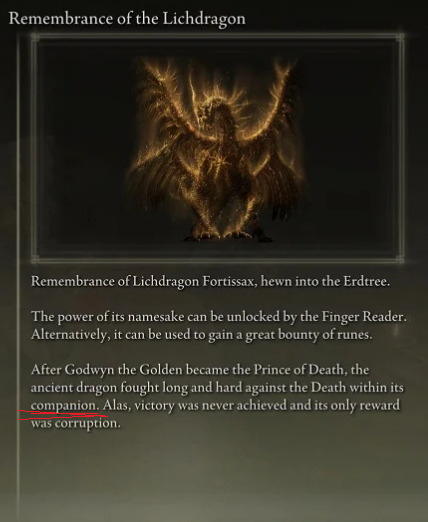
#Do you see my vision?#Fortissax would rather die trying to save Godwyn than abandon him to fester alone#the two becoming “companions” literally ended the war between their communities and allowed the dragons to coexist with the golden order#much like how Radagon and Rennala married to end the war between the erdtree and the carians.#and godwyn has many descendants that are conveniently wiped out pre shattering#one of the only surviving ones having a fascination and kinship with dragons#and his companion is also conveniently completely forgotten by history despite how important they would be historically?#yeah. “Good friends” my ass.#those two loved each other and you can't convince me otherwise#elden ring#elden ring lore#elden ring theory#godwyn the golden#godwyn the prince of death#lichdragon fortissax#fortissax#godrick the grafted
20 notes
·
View notes
Text
I wish I was at home reading yaoi 💔
22 notes
·
View notes
Text





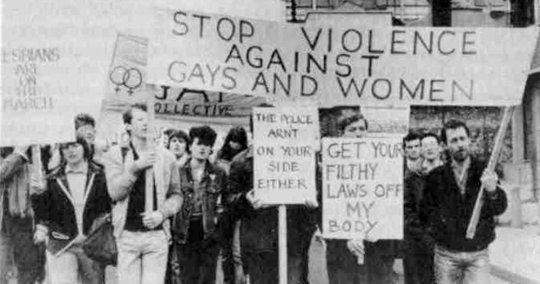

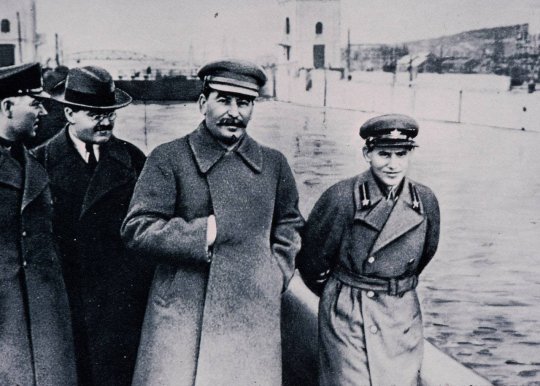
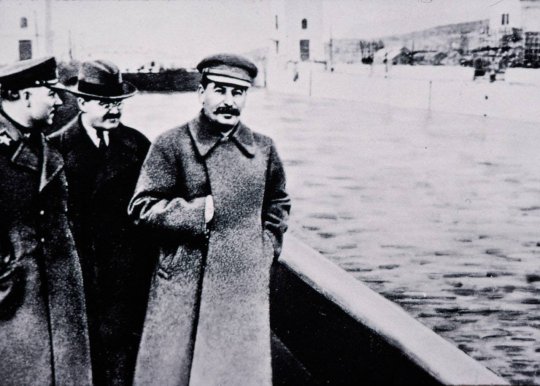

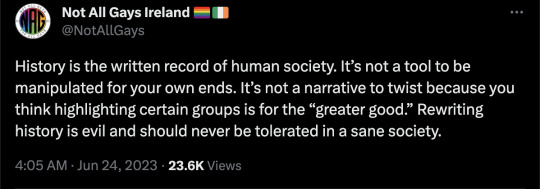
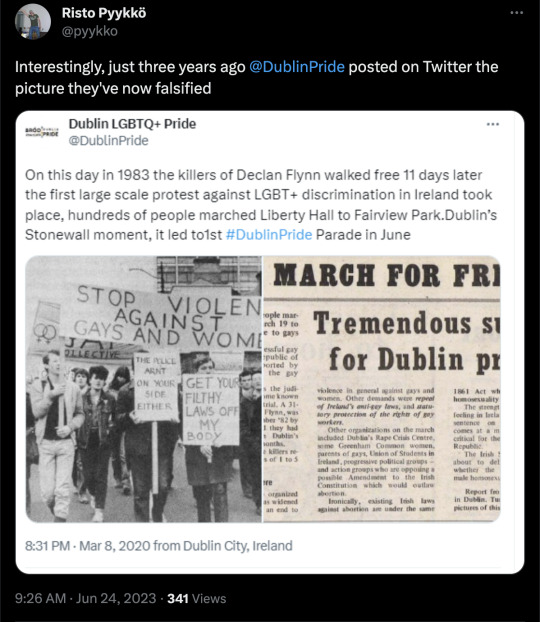
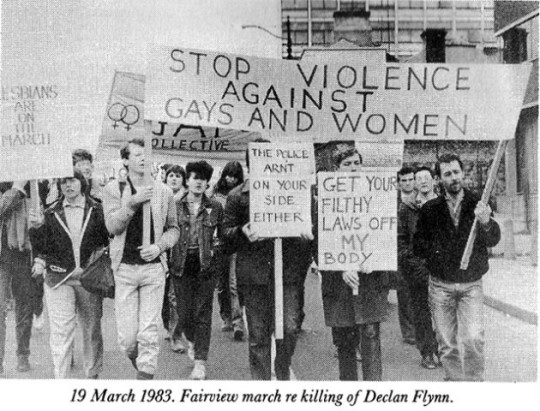
"Every record has been destroyed or falsified, every book has been rewritten, every picture has been repainted, every statue and street and building has been renamed, every date has been altered. And that process is continuing day by day and minute by minute. History has stopped. Nothing exists except an endless present in which the Party is always right."
-- George Orwell, "NIneteen Eighty-Four"
Unethical, dishonest and sinister.
When multiple historians called out the 1619 Project's pervasive historical fraud, known compulsive liar, Nikole Hannah-Jones justified it as "reshaping public memory." That is, it isn't true, but it should be true, and people should believe and insist that it's true.
Dublin Pride has since added some text to their page to handwave the dishonesty. However, anyone using the site and its assets as a historical reference - and why wouldn't they, when it's the official site for Dublin Pride - will be reproducing the images they want them to have, not the ones that are factually accurate. So any news sites that source from their site will be, knowingly or not, perpetuating Dublin Pride's rewrite of their own history.

#Dublin Pride#pride march#gay rights#gay rights march#rewriting history#Orwellian#memory hole#gender ideology#queer theory#gay erasure#revisionist history#historical revisionism#fraud#woke homophobia#Malcolm Michaels Jr.#religion is a mental illness
140 notes
·
View notes